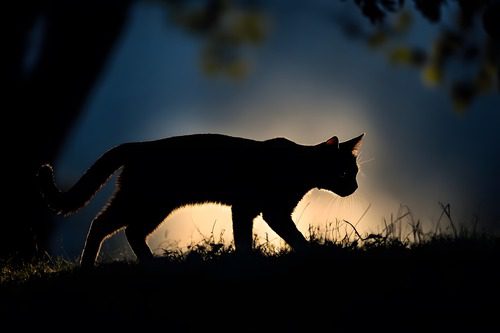
Our Veterinary Blog
Are Cats Nocturnal?
Cats have a reputation for being night owls, often seen prowling the house while their owners sleep. But are cats truly nocturnal, or is their sleep schedule more complex? If you’ve ever wondered about your feline companion’s habits, this blog will explain their unique sleep patterns and what they mean for you. Whether your cat is waking you up at night or snoozing during the day, understanding their natural behavior can help you create a peaceful household. For pet owners in Plant City, FL, Plant City Animal Hospital is here to provide expert advice and support for your cat’s health and behavior. Call (813) 752-3073 to schedule an appointment today.

Understanding Cat Sleep Patterns
Cats are often mistaken as nocturnal because of their nighttime activity. However, cats are actually crepuscular, meaning they are most active during dawn and dusk. This behavior stems from their wild ancestors, who hunted during these twilight hours to catch prey while avoiding predators.
Bursts of Energy in the Morning and Evening
Domesticated cats retain this instinctive behavior, even though they no longer need to hunt for food. You may notice your cat’s bursts of energy early in the morning or late in the evening, which align with their natural tendencies. These crepuscular habits help explain why your cat might be racing around the house just as you’re winding down for the day.
Frequent Naps Throughout the Day
While cats sleep anywhere from 12 to 16 hours daily, their sleep cycles are different from humans. They experience light sleep and frequent naps rather than long stretches of deep sleep. This means your cat is ready to spring into action if something catches their interest, whether it’s a noise outside or a toy on the floor.
Why Are Cats Active at Night?
If your cat’s midnight antics are disrupting your sleep, you might wonder why they’re so lively after dark. Their crepuscular nature, combined with their sharp senses, makes them more alert during the quieter hours of the day. Here are some common reasons cats are active at night:
- Instincts: Your cat’s wild ancestors were nocturnal hunters. Even though domestic cats don’t need to hunt, they may still exhibit these behaviors.
- Boredom: Cats that don’t get enough stimulation during the day may channel their pent-up energy into nighttime activity. Providing interactive toys or play sessions during the day can help reduce this.
- Hunger: Cats are opportunistic eaters. If their feeding schedule doesn’t align with their natural activity patterns, they may seek food at night.
- Attention-Seeking: Cats often associate their owners’ reactions with rewards. If you respond to your cat’s nighttime behavior, they might repeat it to get your attention.
Tips to Manage Nocturnal Behavior
While cats are naturally more active during twilight hours, there are ways to help them settle at night. Here are a few strategies:
- Try feeding your cat their largest meal in the evening to help them feel full and relaxed.
- A long play session before bedtime can help burn off excess energy.
- Provide a cozy, quiet space where your cat feels safe to rest.
- Avoid reinforcing disruptive behavior by responding to it.
If you’re concerned about your cat’s sleep patterns, call Plant City Animal Hospital at (813) 752-3073. Our team can help you determine whether their behavior is normal or if an underlying issue might be contributing.
Are Cats Nocturnal or Crepuscular?
It’s essential to differentiate between nocturnal and crepuscular behaviors when discussing your cat’s activity. While nocturnal animals are most active during the night, crepuscular animals thrive during dawn and dusk. Cats fall into the latter category, making them active at times when light levels are low but not entirely dark.
Why Does This Matter for Pet Owners?
Cats may not be awake all night, but their heightened activity during early morning or evening hours might still disrupt your routine. Knowing when your cat is likely to be active can help you plan playtime, feeding schedules, and other interactions to align with their natural rhythm. Additionally, recognizing these patterns can help you distinguish between normal behavior and potential health concerns. Excessive nighttime activity or changes in sleep patterns might indicate an underlying issue that warrants a veterinary evaluation.
How to Support Your Cat’s Natural Rhythms
Catering to your cat’s crepuscular habits doesn’t mean sacrificing your sleep. Instead, you can implement a few changes to accommodate their needs while maintaining a peaceful household.
Provide Structured Play
Engaging your cat in interactive play sessions during their peak activity times can help satisfy their natural instincts. Toys that mimic prey, such as feather wands or laser pointers, can encourage them to chase and pounce. Scheduling playtime around dawn and dusk can also help your cat expend their energy during appropriate hours.
Offer Puzzle Feeders
Puzzle feeders provide both mental and physical stimulation. These toys challenge your cat to work for their food, mimicking the hunting process. This activity not only keeps them engaged but also aligns with their natural predatory instincts.
Set Up a Safe Space
Designating a specific area for your cat to retreat during their active periods can help them feel secure. This space can include cozy beds, scratching posts, and quiet corners where they can climb or perch. Providing this environment can reduce their need to seek attention during inconvenient times. For personalized advice on supporting your cat’s behavior, schedule an appointment with Plant City Animal Hospital by calling (813) 752-3073.
Could Your Cat’s Nighttime Activity Signal a Health Concern?
While it’s normal for cats to be more active during certain times, sudden changes in their sleep patterns or behavior could indicate an underlying issue. Excessive nighttime activity, vocalizations, or restlessness might stem from health conditions, such as:
- Hyperthyroidism: This condition can cause increased energy and restlessness.
- Cognitive Dysfunction Syndrome: Older cats may experience changes in their sleep-wake cycles.
- Pain or Discomfort: Unexplained activity might be a sign that your cat is trying to communicate physical discomfort.
If you’ve noticed unusual changes in your cat’s behavior, it’s important to consult your veterinarian. Early intervention can address potential health issues and improve your cat’s quality of life.
Helping Cats and Their Owners Thrive
Understanding whether cats are nocturnal is key to creating harmony in your home. While cats are not truly nocturnal, their crepuscular nature means they’re active during the times of day when you might prefer to relax. By aligning your cat’s schedule with yours and providing adequate stimulation, you can minimize disruptions and enjoy a closer bond. For expert guidance on your cat’s behavior or health, contact Plant City Animal Hospital at (813) 752-3073. Our team is here to support you and your feline companion.
Recent Posts
About Us
Family is family, whether it has two legs or four. At Plant City Animal Hospital, we've spent the last 40 years healing and caring for your pets. As a family-operated practice, we know that family is about more than simply being related. Animals give us the ability to develop strong bonds and feel great compassion for a fellow living creature.
